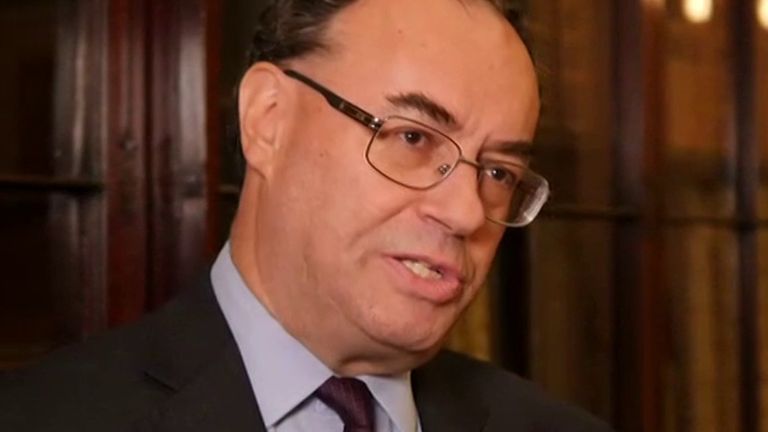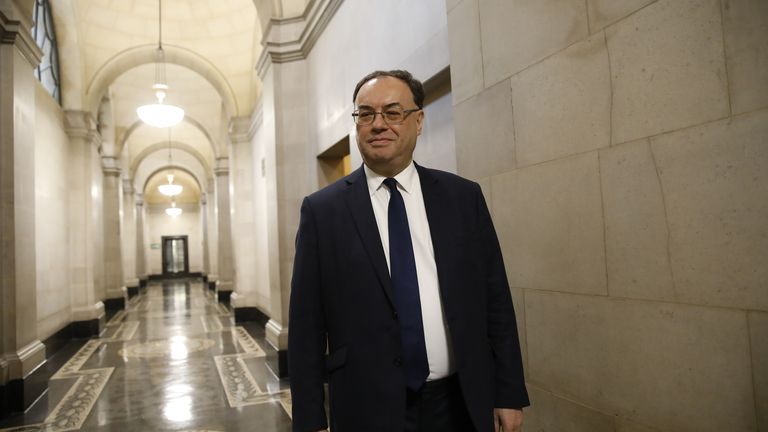Coronavirus: Bank of England 'ready to take action' after economy tanks 20%
Governor Andrew Bailey says there are signs of recovery, but the big question is how much long-term damage has been done.
Friday 12 June 2020 21:02, UK
The head of the Bank of England has said it stands "ready to take action" after the UK suffered a record economic collapse over the coronavirus lockdown.
However, while governor Andrew Bailey acknowledged the 20.4% drop in GDP in April was "a dramatic and big number", he said there were "signs of the economy now beginning to come back to life".
His comments came after the Office for National Statistics said the economy was around 25% smaller in April than it was in February, before the COVID-19 restrictions came into force.
The figures underlined the damage inflicted by the coronavirus pandemic, which saw many businesses shut down in a bid to curb the spread of infection.
Mr Bailey said: "Obviously it's a dramatic and big number. But it's not surprising, the economy clearly closed out substantially at the end of March into April, so not surprising.
"The big question is what happens next. We've been monitoring a lot of very high frequency data these days... which is why, we had a reasonably good read on what was going to happen in April.
"We see signs of the economy now beginning to come back to life in the high frequency data.
"Obviously it's early days. I don't want to emphasise too much. It's a gradual coming back into life. But we do see those signs. So I think that's evidence of things starting up again."
But he argued the big question was how much long-term economic damage the public health emergency had caused.
Mr Bailey said: "That's the thing we've got to be very focused on, because that's where jobs get lost.
"Now we hope that will be as small as possible, but we have to be ready and ready to take action, not just the Bank of England, but more broadly on what we can do to offset those longer-term and damaging effects.
"So we stand ready to take action. We've already taken very big action, and that's still going on I should say. And we have to be ready for that because we are still very much in the midst of this."
Widespread contractions across the economy contributed to the fall in GDP.
In the three months to April, the ONS data shows that accommodation and food services plummeted by 40.1%, with the closure of hotels, bars and restaurants throughout March and April.
Manufacturing and construction also saw significant falls of 10.5% and 18.2% respectively.
Prime Minister Boris Johnson has said the figures were no surprise as Britain's huge services sector was being hit
particularly hard by social distancing measures, but expressed confidence that the economy "will bounce back".
Scale of the monumental fall is enough to take the breath away
Ed Conway, economics editor
Everyone knew it would be bad. But this bad?
We have never seen economic output fall as sharply as it did in the month of April. We will almost certainly never see anything like it again.
And while most of us expected something a bit like this - a monumental fall as the economy went into lockdown - the scale of it is nonetheless enough to take the breath away.
Put April's 20.4% contraction together with March's fall and you're talking about the UK economy being a quarter smaller than it was before COVID-19 hit.
When the Bank of England and Office for Budget Responsibility said a month or two ago that we were facing a recession the likes of which this country hadn't seen for three centuries, some thought them guilty of hyperbole.
It turns out they might have even been a bit conservative with their economic scenarios.
Gross domestic product, it's worth saying, may be a bit of economic terminology, but it matters for all of us.
For it is very simply a count of all the money generated and economic activity carried out across the UK in a given period.
It is, for all its faults, the best measure of how well we are doing as an economy, how much income we are generating and sharing out. So a collapse like this is of deep significance.
It goes without saying that the UK is in recession: we all knew that.
It also goes without saying that this will be a very unusual recession - unusually deep but with an unusually quick bounce back.
:: Listen to the Daily podcast on Apple Podcasts, Google Podcasts, Spotify, Spreaker
The real question is how soon that bounce happens and how close it takes the economy to where it was before the virus struck.
And on that front the news is quite worrying.
Most economists long ago gave up on the idea of a quick, V-shaped recovery where we are back to where we were within a few months.
Instead the expectation, one fuelled by the OECD's latest forecasts earlier this week, is that it will take many years to get back to where we started.
And the longer lockdown goes on for, the deeper the recession will be.








